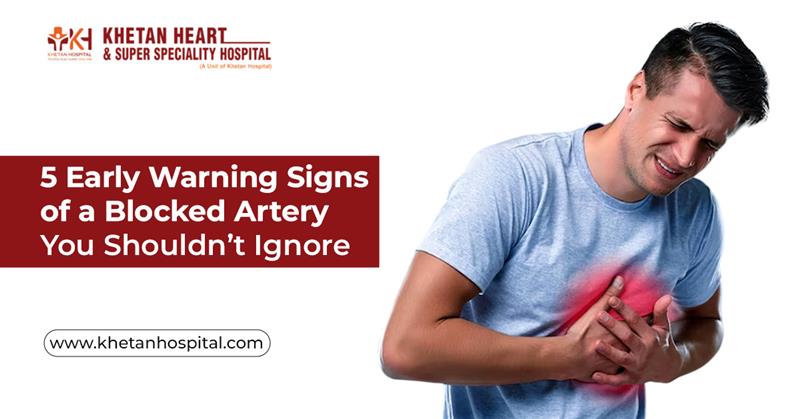Picture your arteries as highways carrying life itself, blood, oxygen, and nutrients, to every organ. Now imagine traffic piling up because the lanes are narrowed with debris. That’s what happens when arteries get blocked. The scariest part? It builds quietly, sometimes for years, and before a heart attack or stroke strikes, your body usually whispers little warnings.
The question is, are you listening? Let’s explore five early clues of the Early signs of blocked artery
1. A Strange Pressure in the Chest
It may not be sharp pain. Sometimes it’s more subtle. A heaviness, like carrying a backpack strapped to your chest. A squeezing that comes when you walk quickly and fades when you rest. Some people call it “discomfort,” others say it feels like “a belt pulled too tight.”
Whatever the description, it usually means your heart muscle isn’t getting the blood it needs. That’s not something to ignore.
2. Fatigue That Doesn’t Make Sense
We all feel tired after a long day. But blocked arteries bring a different kind of tiredness. The type that sneaks in when you’ve done very little. Like making the bed. Like walking across the room.
It’s almost as if your body’s battery drains too quickly. Women often report this before other warning signs show up, which makes it easy to dismiss as “just stress” or “just hormones.” But it can be more than that.
3. Pain That Travels
Jaw ache, arm discomfort, back strain—it’s not always where you’d expect. The nerves are connected, so the brain sometimes misreads where the pain originates. A sore jaw might be your heart, not your teeth.
4. Shortness of Breath or Dizziness
Ever walked up a few stairs and felt like you were pulling a suitcase with a broken wheel? Breathless, worn out, a little lightheaded? That’s what happens when blood flow is restricted.
The lungs don’t get enough oxygen, the heart strains, and suddenly, what used to be easy feels difficult. Some people even notice shortness of breath when lying flat in bed. Again, not something to shrug off.
5. Cold Hands, Numb Toes, Slow Healing
Poor circulation leaves marks:
- Icy fingers and feet
- Tingling or numbness
- Wounds that take longer than usual to heal
These are classic signs of poor blood circulation, and ignoring them can be costly.
Why Do Arteries Get Blocked?
The common artery blockage causes include:
- Diets rich in fried or processed food
- Long periods of inactivity
- Smoking or alcohol misuse
- Diabetes and high blood pressure
- Genetics and family history
Modern Ways Doctors Detect Trouble
Medicine isn’t what it was, doctors know how to find problems earlier these days:
- CT scans indicating narrowing of the arteries
- Advanced blood tests looking for hidden inflammation
- Smartwatches flagging irregular rhythms
- AI-assisted tools that help cardiologists read scans more quickly
This is why early checkups are important, they are aimed at catching problems before they happen.
How to Protect Your Arteries Daily
- Simple choices, repeated consistently, protect you:
- Eat fresh and feel fresh like veggies, nuts, seeds, fish, and fruit.
- Keep going like brisk walking, even counts.
- Quit smoking
- Tame stress with yoga, prayer, or simply quiet breathing exercises
- Regular checkups because prevention always beats cure
When to See a Doctor
If you notice chest pressure, unexplained fatigue, or recurring pain, don’t gamble. In cities like Jaipur, meeting a trusted cardiologist in Jaipur can help you get the right tests and treatment before the condition worsens.
Quick Recap
- Chest heaviness or pressure
- Tiredness without reason
- Pain radiating to arms, jaw, or back
- Shortness of breath or dizziness
- Cold hands, numbness, delayed healing
These are your body’s whispers. Don’t wait for the shout.
Frequently Asked Questions
Q1. Can blocked arteries be reversed naturally?
Not fully, but healthier food, daily exercise, and quitting smoking can slow down or reduce plaque buildup significantly.
Q2. Which foods help prevent artery blockages?
Leafy greens, oats, berries, walnuts, almonds, flaxseeds, and oily fish like salmon or mackerel. They act like natural cleaners for your arteries.
Q4. When should I seek medical help?
Immediately, if you notice chest pressure, pain that radiates, or severe shortness of breath. Even mild but persistent symptoms should prompt a checkup.
Final Word
Your body doesn’t stay silent, it leaves clues. Some are small, some are loud. The sooner you recognize these early signs of blocked artery problems, the greater your chances of staying heart-healthy for decades. Think of it this way: the earlier you clear the traffic on your body’s highways, the smoother the journey of life will be.

